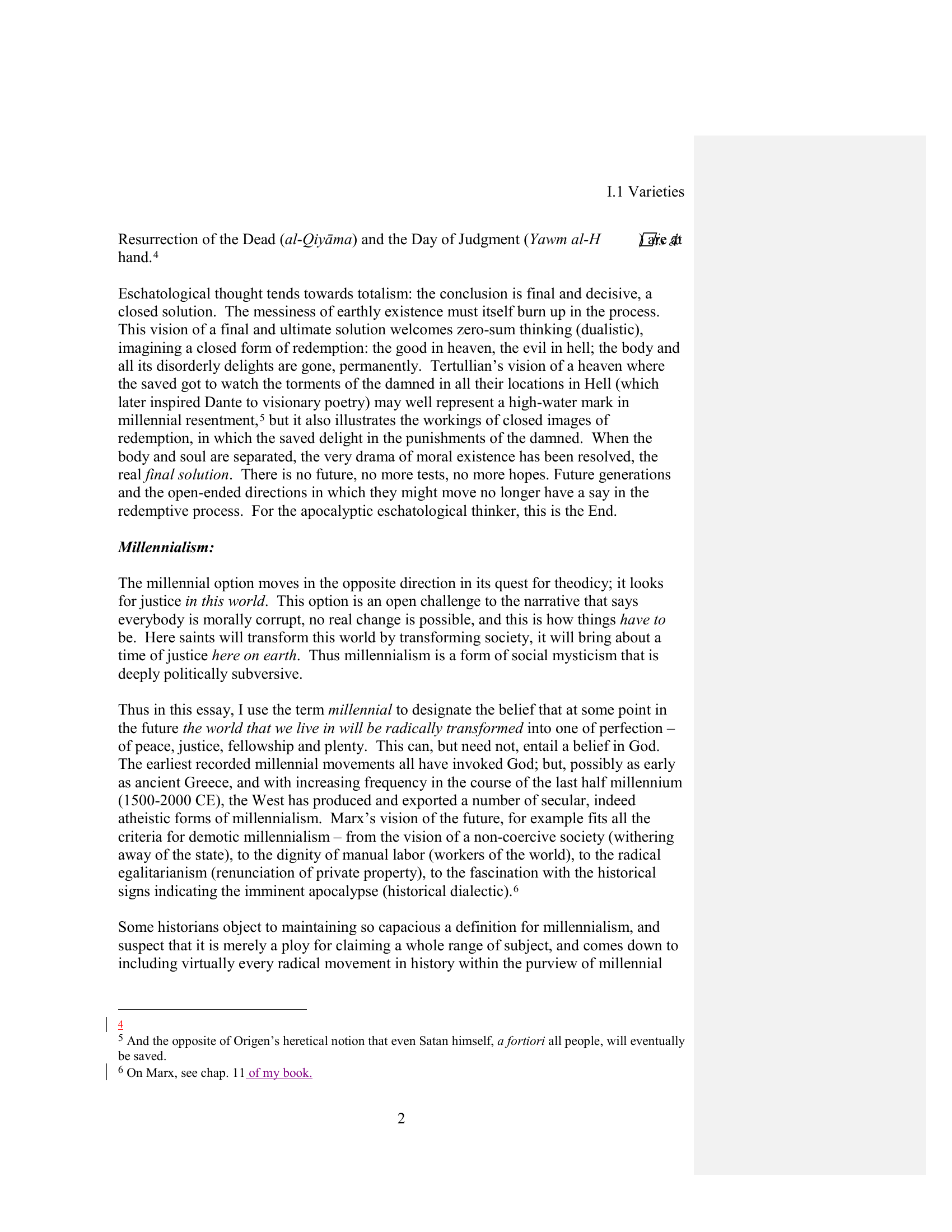The Varieties of the Millennial Experience
Publié le 21/11/2011
Extrait du document

DOCUMENT DE 23 PAGES
In order to understand millennial beliefs and their apocalyptic movements, we must become familiar with their fundamental tensions. What I offer here below is a typology of millennial and apocalyptic types. This typology, however, represents only a static view of the phenomenon. Nothing takes shape and mutates faster over (apocalyptic) time than a millennial movement which can go from waxing enthusiasm to devastating disappointment in a matter of days, months, at most years. In order, then, to illustrate how these varieties can appear and mutate within a single movement, I will use the example of one of the religious movements whose apocalyptic and millennial dimensions are relatively unknown.
Eschatology: This notion holds that at the end (eschaton) of “time”, the Lord will judge the quick and the dead, all, together, publicly. This apocalyptic theodicy can give birth to two possible aftermaths:
1)
2)
There are, of course, both religious and secular variants of eschatology. If God does not bring his creation to an end, the universe may, in the form, for example, of comets colliding with earth.

«
I.1 Varieties
2
Resurrection of the Dead ( al-Qiy āma ) and the Day of Judgment ( Yawm al-H i s āb) are at
hand. 4
Eschatological thought tends towards totalism: the conclusion is final and decisive, a
closed solution.
The messiness of earthly existence must itself burn up in the process.
This vision of a f inal and ultimate solution welcomes zero -sum thinking (dualistic),
imagining a closed form of redemption: the good in heaven, the evil in hell; the body and
all its disorderly delights are gone, permanently.
Tertullian’s vision of a heaven where
the saved got to watch the torments of the damned in all their locations in Hell (which
later inspired Dante to visionary poetry) may well represent a high -water mark in
millennial resentment,
5 but it also illustrates the workings of closed images of
redemption, in which the saved delight in the punishments of the damned.
When the
body and soul are separated, the very drama of moral existence has been resolved, the
real final solution .
There is no future, no more tests, no more hopes.
Future generations
and the open -ended directions in which they might move no longer have a say in the
redemptive process.
For the apocalyptic eschatological thinker, this is the End.
Millennialism:
The millennial option moves in the opposite direction in its quest for theodicy; i t looks
for justice in this world .
This option is an open challenge to the narrative that says
everybody is morally corrupt, no real change is possible, and this is how things have to
be.
Here saints will transform this world by transforming society, it will bring about a
time of justice here on earth .
Thus millennialism is a form of social mysticism that is
deeply politically subversive.
Thus in this essay, I use the term millennial to designate the belief that at some point in
the future the world t hat we live in will be radically transformed into one of perfection –
of peace, justice, fellowship and plenty.
This can, but need not, entail a belief in God.
The earliest recorded millennial movements all have invoked God; but, possibly as early
as anc ient Greece, and with increasing frequency in the course of the last half millennium
(1500 -2000 CE), the West has produced and exported a number of secular, indeed
atheistic forms of millennialism.
Marx’s vision of the future, for example fits all the
cri teria for demotic millennialism – from the vision of a non- coercive society (withering
away of the state), to the dignity of manual labor (workers of the world), to the radical
egalitarianism (renunciation of private property), to the fascination with the historical
signs indicating the imminent apocalypse (historical dialectic).
6
Some historians object to maintaining so capacious a definition for millennialism, and
suspect that it is merely a ploy for claiming a whole range of subject, and comes down to
including virtually every radical movement in history within the purview of millennial
4 5 And the opposite of Origen’s heretical notion that even Satan himself, a fortiori all people, will eventually
be saved.
6 On Marx, see chap.
11 of my book..
»
↓↓↓ APERÇU DU DOCUMENT ↓↓↓
Liens utiles
- The different phases resulting from culture changes, illustrated by my personal experience
- Electric Ladyland [The Jimi Hendrix Experience] - analyse de l'oeuvre musicale.
- Martin Scorsese Martin Scorsese, born in 1942, American motion-picture director, whose best films have reflected the Italian American experience of his childhood in New York City's Little Italy neighborhood.
- These poems explore encounters between the speaker or a character and a force that is greater than he is – How do the poets develop and contemplate this experience? Refer to the details of language and effect as you compare these poems.
- exposé anglais introduction to the Consumer Society

































